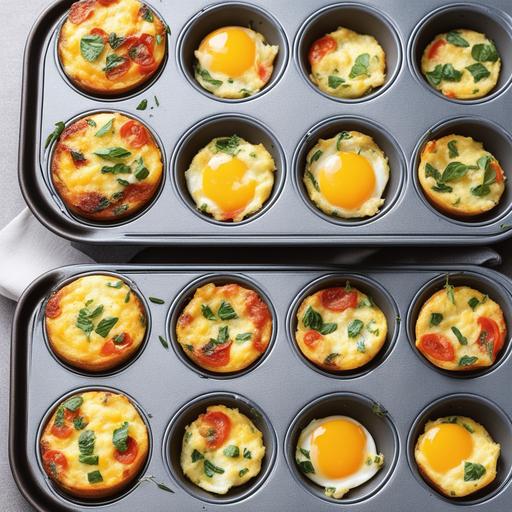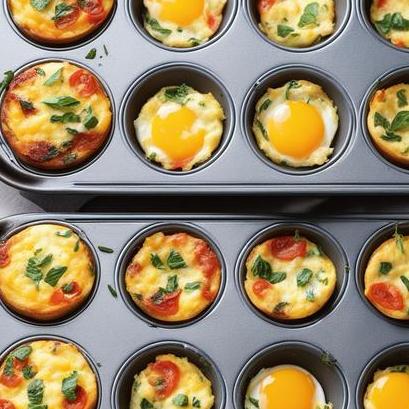
Egg Muffins Oven Recipe: A Delicious And Versatile Breakfast Option
Egg muffins are a fantastic and easy-to-make breakfast treat that can be enjoyed by everyone, from busy professionals on the go to families looking for a healthy and delicious way to start their day. Packed with protein and customizable with an array of flavors, these muffins are a delightful way to begin your morning. In this comprehensive guide, we will delve into the food science behind egg muffins, provide culinary details, discuss ingredient selection and cleaning, share preparation tips and variations, cover doneness checks, offer a mouthwatering recipe, and even touch upon the pitfalls of overcooking or undercooking these delectable treats. So, let’s get cracking!
The Science of Egg Muffins: A Nutritional Powerhouse
Before we embark on the culinary journey of creating egg muffins, let’s take a moment to appreciate the nutritional benefits they offer. Eggs, the star of this recipe, are a rich source of high-quality protein, essential vitamins, and minerals. The generous protein content aids in muscle repair and growth, keeps you feeling fuller for longer, and provides sustained energy throughout the day. Additionally, eggs contain choline, essential for brain development and cognitive function, as well as lutein and zeaxanthin, known for promoting healthy eyesight.
Culinary Details: The Art of Perfect Egg Muffins
To create truly outstanding egg muffins, paying attention to certain culinary details is crucial. Understanding the basic principles of cooking eggs will help you achieve the desired texture and flavor. Whether you prefer a fluffy and tender muffin or a dense and chewy bite, consider the following factors:
Ingredient Selection and Cleaning:
- Eggs: Fresh eggs are of utmost importance when preparing egg muffins. Choose eggs with intact shells, free from any cracks or abnormalities. Organic or free-range eggs can provide enhanced taste and quality.
- Milk or Cream: Incorporating a small amount of milk or cream into your mixture can yield a softer texture in the final product. Choose whichever you prefer, though avoid ultra-pasteurized varieties, as they may affect texture.
- Cheese and Fillings: Get creative with your choice of fillings! Opt for flavorful cheeses such as cheddar, feta, or mozzarella. Vegetables like bell peppers, spinach, or mushrooms can add a nutritious boost. Cooked meats like bacon or ham can offer a delightful savory twist.
Ensure you thoroughly clean your chosen ingredients, especially fresh vegetables, to maintain food safety and hygiene in your kitchen.
Preparation Tips and Variations:
When it comes to preparing egg muffins, there are numerous tips and variations to explore. Here are a few suggestions to take your muffins to the next level:
- Whisking: Whisking the eggs vigorously for a few minutes helps incorporate air and creates a lighter texture when baked. The more air you incorporate, the fluffier your muffins will be.
- Seasoning: Don’t be afraid to experiment with seasonings and spices. Try adding a pinch of black pepper, paprika, or dried herbs like thyme or oregano to infuse your muffins with extra flavor.
- Mini vs Regular Muffins: While the traditional muffin size works perfectly fine, consider using a mini muffin tin to create bite-sized treats. These are great for parties or when you want to offer a variety of flavors.
- Make-Ahead and Freezing: Egg muffins can be prepared in advance and stored in the refrigerator or freezer for later consumption. This makes them an excellent option for meal prepping or quick, on-the-go breakfasts.
Feel free to unleash your creativity by experimenting with different ingredients and flavors. The possibilities are endless!
Checking Doneness: The Perfect Balance

As with any baked dish, finding the correct balance between overcooking and undercooking is essential for egg muffins. Overcooking can result in dry and rubbery muffins, while undercooking can leave them runny and unappetizing. So, how can you ensure your muffins are perfectly cooked?
- Temperature: Preheat your oven to 350°F (175°C), which is the recommended temperature for most egg muffin recipes. Keep in mind that ovens may vary, so familiarize yourself with yours and consider adjusting the temperature accordingly.
- Visual Cues: Observe the muffins while they are baking. They should rise and turn golden brown on top. A toothpick inserted into the center should come out clean or with minimal clingy egg residue.
- Texture: Gently press the center of a muffin with a fingertip. If it is firm but still slightly tender, they are likely done. Avoid pressing too hard, as it may deflate your muffin.
Remember, practice makes perfect. Don’t be discouraged if your first few attempts aren’t flawless. Try adjusting your cooking time and temperature until you achieve the desired results.
Egg Muffins Oven Recipe: A Well-Balanced and Versatile Delight

Now that we have explored the science, culinary details, and tips, it’s time to dive into a delightful egg muffin recipe. This recipe serves as a foundation for creating your variations, and the possibilities are endless:
Ingredients:
- 6 large eggs
- 1/4 cup milk or cream
- 1/2 cup shredded cheddar cheese
- 1/4 cup diced bell peppers
- 1/4 cup chopped spinach
- Salt and pepper to taste
- Cooking spray or olive oil for greasing the muffin tin
Instructions:
- Preheat your oven to 350°F (175°C).
- Grease a 12-cup muffin tin with cooking spray or olive oil.
- In a mixing bowl, whisk the eggs and milk together until frothy and well combined.
- Add the shredded cheese, diced bell peppers, chopped spinach, salt, and pepper to the egg mixture. Stir until all the ingredients are evenly distributed.
- Pour the egg mixture into the greased muffin tin, filling each cup about 2/3 full.
- Place the tin in the preheated oven and bake for approximately 15-20 minutes or until the muffins are golden brown and set.
- Once done, remove the muffin tin from the oven and allow the muffins to cool for a few minutes.
- Using a spoon or a butter knife, carefully loosen the edges of the muffins and transfer them to a plate or wire rack to cool completely.
- Serve your mouthwatering egg muffins warm or refrigerate them for later consumption.
Overcooking and Undercooking: Common Pitfalls to Avoid
While the above recipe serves as a guideline for perfectly cooked egg muffins, it’s important to be wary of overcooking or undercooking them. Here are a few tips to tackle these common pitfalls:
- Overcooking: To avoid dry and rubbery muffins, reduce the baking time slightly and keep a close eye on them. Check their progress using visual cues, temperature, and texture indicators mentioned earlier.
- Undercooking: If your muffins appear runny or undercooked, increase the baking time gradually. Monitor them closely and ensure they are fully set before removing them from the oven. Adjusting the oven temperature can also help achieve the desired consistency.
Remember, each oven is different, and practice makes perfect. With a bit of experimentation, you’ll find the ideal timing and temperature to achieve perfectly cooked and fluffy egg muffins.
Conclusion: A Versatile and Nourishing Breakfast Delight
In conclusion, egg muffins are a versatile and delicious breakfast option that can be personalized to suit anyone’s taste. Whether you’re preparing them as a quick grab-and-go option or hosting a brunch feast, these muffins are sure to please. The science of egg muffins, culinary details, ingredient selection, preparation tips, variations, and the importance of achieving the right degree of doneness have been thoroughly explored within this comprehensive guide. Armed with knowledge and armed with the delectable recipe provided, you are ready to embark on a culinary adventure that will surely tantalize your taste buds. So, get your muffin tins ready, and enjoy the delightful journey of egg muffin mastery!
Note: The cooking time mentioned in the recipe may vary depending on your oven, muffin tin, and desired texture. It’s always a good practice to keep an eye on your muffins while baking and adjust the time accordingly.
Sources
FAQS On Egg Muffins Oven Recipe
What Are Egg Muffins?
Egg muffins are a type of baked egg dish that is similar to quiches or frittatas. They are usually made by whisking eggs and adding in various ingredients such as vegetables, cheese, and meats. This mixture is then poured into muffin tins and baked in the oven until the eggs are set.
How Do I Make Egg Muffins?
To make egg muffins, you’ll need to beat eggs with various ingredients such as chopped vegetables, cheeses, and meats. Then, pour the mixture into muffin tins and bake them in the oven until the eggs are set. There are many different variations of egg muffins that you can make, depending on your preferences.
Can I Make Egg Muffins Ahead Of Time And Freeze Them?
Yes, you can make egg muffins ahead of time and freeze them. Simply wrap each muffin individually in plastic wrap or aluminum foil and store them in the freezer for up to three months. To reheat, remove from the freezer and defrost in the refrigerator overnight. Then, microwave for 30 seconds to one minute, or until hot.
Can I Customize The Ingredients In My Egg Muffins?
Yes, you can customize the ingredients in your egg muffins to suit your preferences. You can add in vegetables such as spinach, tomatoes, and onions, or meats such as bacon, sausage, or ham. You can also add in various cheeses for extra flavor. The possibilities are endless!
How Long Do Egg Muffins Keep In The Refrigerator?
Egg muffins can typically be stored in an airtight container in the refrigerator for up to four days. To reheat, simply microwave for 30 seconds to one minute, or until hot. If you want to store them for longer, you can freeze them for up to three months.



